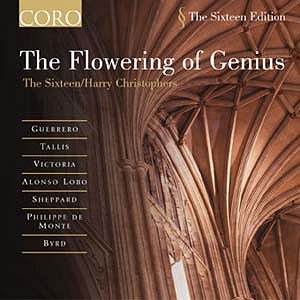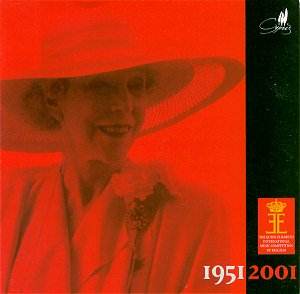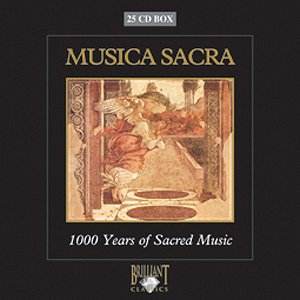 Composer: Various
Composer: Various
Works:
1. Ave Virgo sanctissima – Francisco Guerrero
2. Suscipe quaeso – Thomas Tallis
3. O vos omnes – Tomás Luis de Victoria
4. Vere languores – Tomás Luis de Victoria
7. Super flumina Babylonis – Tomás Luis de Victoria
8. Vadam et circuibo – Tomás Luis de Victoria
10. Verbum caro – John Sheppard
11. Super flumina Babylonis – Philippe de Monte
12. Quomodo cantabimus – William Byrd
Performers: The Sixteen, conducted by Harry Christophers
Recording: Rec: September 1989, 1996, September 1997, January 1998
Label: CORO COR 16001
5. O Domine Iesu Christe – Tomás Luis de Victoria
The renaissance period, a crucible of transition from the somberness of the Middle Ages to the flourishing of humanistic expression, is adeptly encapsulated in “The Flowering of Genius.” This anthology, curated by Harry Christophers and performed by The Sixteen, presents a fascinating juxtaposition of English and Spanish sacred music, highlighting the profound interconnections that emerged during a pivotal moment in history—the summer of 1553, which heralded the imminent Catholic restoration in England. The works, predominantly written in Latin and performed a cappella, reflect a meditative spirituality that diverges from the more exuberant tendencies often associated with the renaissance.
The performances on this recording showcase The Sixteen’s signature clarity and blend, attributes that are especially vital for the polyphonic intricacies inherent in this repertoire. Each piece is imbued with a sense of solemnity and introspection, particularly evident in Tallis’s “Agnus Dei” from the Mass “Puer natus.” Here, the choir’s rich sonorities and nuanced dynamics create an enveloping atmosphere that invites contemplation. The harmonic progressions, lush and many-layered, are rendered with meticulous attention to phrasing and articulation, allowing the listener to appreciate the delicate interplay between the voices.
Tomás Luis de Victoria’s “Super flumina Babylonis” stands out with its hauntingly beautiful melismas and poignant text setting. The Sixteen’s interpretation captures the poignant lament inherent in the text, with the singers adeptly navigating the tension between the text’s sorrow and the music’s ethereal beauty. This is a hallmark of their interpretation, as they maintain a vibrant tonal palette that never lapses into monotony. The engineering of the recording further enhances this experience, providing a warm yet spacious acoustic that allows the intricate counterpoint to emerge distinctly, a crucial aspect when dealing with such densely woven vocal textures.
Moreover, John Sheppard’s “Verbum caro” reveals the choir’s capacity for expressive nuance. The balance achieved here between the Gregorian chant influences and the evolving Renaissance style showcases their technical prowess and interpretive insight. The articulation of the text is particularly notable; each Latin phrase is delivered with clarity, ensuring that the listener remains engaged with the theological depth of the works.
While several recordings exist of these composers, the depth of interpretation and the technical execution on this disc places it among the more distinguished offerings. The Sixteen’s ability to evoke the spiritual essence of the music, combined with Christophers’ insightful direction, provides a refreshing and deeply rewarding listening experience.
This anthology not only affirms The Sixteen’s reputation as one of the premier ensembles for Renaissance vocal music but also serves as a testament to the enduring power of this repertoire. The rich tapestry of sound, combined with the historical context of the works, creates an immersive experience that resonates long after the final notes fade. A commendable release that will undoubtedly enrich any collection of early choral music.



